
Forever Changes is the third studio album by the American rock band Love, released on November 1, 1967, by Elektra Records. The album saw the group embrace a subtler folk- and baroque pop-oriented sound based around acoustic guitars and orchestral arrangements, while primary songwriter Arthur Lee explored darker themes alluding to mortality and his growing disillusionment with the era's counterculture. It was the final album recorded by the original band lineup; after its completion, guitarist Bryan MacLean left the group acrimoniously, and Lee subsequently dismissed the other members.
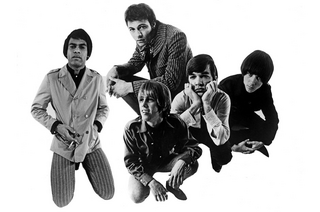
Love is an American rock band formed in Los Angeles in 1965. Led by Arthur Lee, the band's primary songwriter, they were one of the first racially diverse American rock bands. Their sound incorporated an eclectic range of styles including garage, folk-rock, and psychedelia. While finding only modest success on the music charts, peaking in 1966 with their US Top 40 hit "7 and 7 Is", Love would come to be praised by critics as their third album, Forever Changes (1967), became generally regarded as one of the best albums of the 1960s.

"Mr. Tambourine Man" is a song written by Bob Dylan, released as the first track of the acoustic side of his March 1965 album Bringing It All Back Home. The song's popularity led to Dylan recording it live many times, and it has been included in multiple compilation albums. It has been translated into other languages and has been used or referenced in television shows, films, and books.
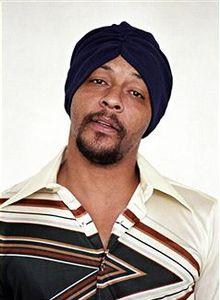
Arthur Taylor Lee was an American musician, singer and songwriter who rose to fame as the leader of the Los Angeles rock band Love. Love's 1967 album Forever Changes was inducted into the Grammy Hall of Fame, and it is part of the National Recording Registry.

"Hey Joe" is an American song from the 1960s that has become a rock standard and has been performed in many musical styles by hundreds of different artists. The lyrics tell of a man who is on the run and planning to head to Mexico after shooting his unfaithful wife. In 1962, Billy Roberts registered "Hey Joe" for copyright in the United States.

Da Capo is the second studio album by American rock band Love, released in November 1966 by Elektra Records. The album was recorded during September and October 1966 at RCA Studios in Hollywood, California, with the exception of lead single "7 and 7 Is", recorded the previous June. The single was a departure for the band and became their highest charting, reaching No. 33 on the Billboard Hot 100. Despite the success of "7 and 7 Is", a string of well received live performances at the time and contemporary critical acclaim for the album upon its release, it peaked at No. 80 on the Billboard 200.
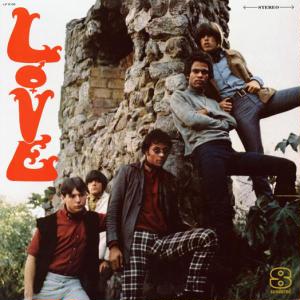
Love is the debut album by the Los Angeles-based rock band Love; released in March 1966 by Elektra Records.
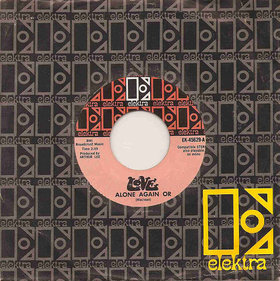
"Alone Again Or" is a song originally recorded in 1967 by the rock group Love and written by band member Bryan MacLean. It appears on the album Forever Changes, and was released as a single in the USA, UK, Australia, France and the Netherlands.
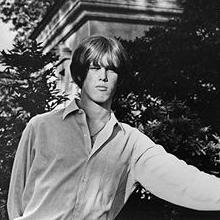
Bryan Andrew MacLean was an American singer, guitarist and songwriter, best known for his work with the influential rock band Love. His famous compositions for Love include "Alone Again Or", "Old Man" and "Orange Skies".

"Please Let Me Wonder" is a song by the American rock band the Beach Boys from their 1965 album The Beach Boys Today!. Written by Brian Wilson and Mike Love, it was the first song Wilson wrote under the influence of marijuana. The lyrics are about a man who does not know if a girl loves him and is afraid of learning the answer, and so he prefers to fantasize that she does. On February 15, the song was issued as the B-side to their "Do You Wanna Dance?" single before the album's release.
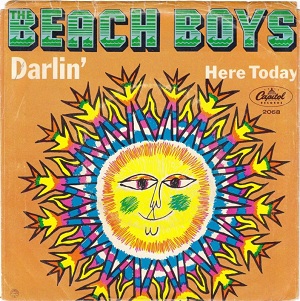
"Darlin'" is a song by American rock band the Beach Boys from their 1967 album Wild Honey. Written by Brian Wilson and Mike Love, it was inspired by singer Danny Hutton and was originally intended to be recorded by an early version of Three Dog Night. Carl Wilson ultimately sang the lead vocal.

"Mr. Soul" is a song recorded by the Canadian-American rock band Buffalo Springfield in 1967. It was released June 15, 1967, as the B-side to their fourth single "Bluebird" and later included on the group's second album Buffalo Springfield Again.
"Cowgirl in the Sand" is a song written by Neil Young and first released on his 1969 album Everybody Knows This Is Nowhere. Young has included live versions of the song on several albums and on the Crosby, Stills, Nash and Young album 4 Way Street. It has also been covered by The Byrds on their self-titled album. Like three other songs from Everybody Knows This Is Nowhere, "Cinnamon Girl", "Down by the River" and the title track, Young wrote "Cowgirl in the Sand" while he was suffering from the flu with a high fever at his home in Topanga, California.
"Powderfinger" is a song written by Neil Young, first released on his 1979 album Rust Never Sleeps. It subsequently appeared on several of Young's live recordings. A 2014 Rolling Stone special issue on Young ranked it as Young's best song ever.

"She Comes in Colors" is a song written by Arthur Lee and released by the band Love as a single in 1966 and on their 1966 album Da Capo. It was also included on a number of Love compilation albums, including Love Revisited and Best of Love and on the multi-artist compilation album Forever Changing: The Golden Age of Elektra 1963–1973.

"¡Que Vida!" is a song written by Arthur Lee and first released in 1967 by the band Love. It was released both on Love's album Da Capo and as a single, backed with "Hey Joe". It has also been included on several Love compilation albums.

"Stephanie Knows Who" is a song written by Arthur Lee and first released by Love on their 1966 album Da Capo. It has also been released on several Love compilation albums. It was to have been released as a single, backed with "Orange Skies", but the single was withdrawn, with "She Comes in Colors" replacing it under the same catalog number. The song was also covered by the Move.

Edward Hoh was an American rock drummer who was active in the 1960s. Although primarily a studio session and touring drummer, Hoh exhibited a degree of originality and showmanship that set him apart and several of his contributions have been singled out for acknowledgment by music critics.
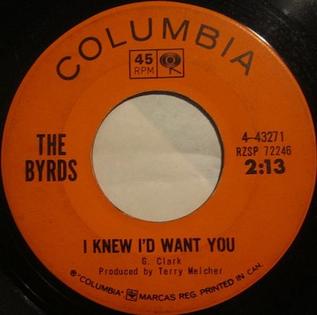
"I Knew I'd Want You" is a song by the folk rock band the Byrds, written by band member Gene Clark, and first released as the B-side to their 1965 debut single, "Mr. Tambourine Man". It was also later included on their debut album, Mr. Tambourine Man.

"Everybody Knows This Is Nowhere" is a song written by Neil Young that was originally released as the title track of his 1969 album with Crazy Horse, Everybody Knows This Is Nowhere. The song was written earlier, and a different version was originally considered for Young's 1968 solo debut album Neil Young.


















